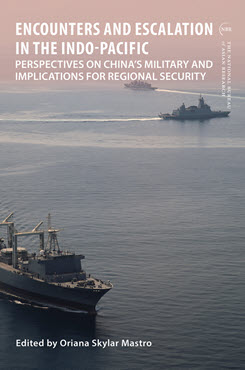Essay in NBR Special Report 108
The PLA’s Strategic Deterrence
A Case Study of the April 2023 Exercises toward Taiwan
This essay examines the April 2023 military exercises by the People’s Liberation Army (PLA) in the vicinity of Taiwan, explores the PLA’s concept of military deterrence, and assesses the impact on Taiwan’s threat perception.
EXECUTIVE SUMMARY
MAIN ARGUMENT
Under the strategic deterrence framework, the Chinese Communist Party (CCP) has intensified military pressure on Taiwan, as highlighted by the PLA’s April 2023 military drills. This trend reflects Xi Jinping’s resolve to use military means to deter Taiwanese independence and undermine Taiwan’s global engagement efforts, particularly with the U.S. The CCP’s actions aim to showcase military prowess, evaluate readiness, and assert claims over Taiwan, signaling to the world its strategic intentions and readiness to use force to meet its goals. The PLA’s exercises combine military, informational, and psychological strategies to achieve strategic objectives beyond conventional combat. Beijing is the primary actor executing military threats, including large-scale exercises and intrusions, directly challenging the status quo in the Taiwan Strait.
POLICY IMPLICATIONS
- Chinese strategic literature and PLA sources highlight the importance of both strategic and military deterrence. The PLA’s actions toward Taiwan not only aim to create a psychological impact but also seek to gain tactical or operational advantages by reducing the warning time for Taiwan and its allies about potential military operations.
- If Taiwan continues to enhance its asymmetric warfare capabilities and domestic production of defense resources, such as munitions, drones, and mines, then it will strengthen its deterrence against the People’s Republic of China by making any potential conflict more costly and complex for the aggressor.
- If the U.S. and other democratic nations balance their military presence in the Indo-Pacific with robust diplomatic and economic efforts, these actions could complement those of Taiwan in strengthening the region’s security architecture and deterrence against Chinese expansionism.
Yu-cheng Chen is an Associate Professor at the Graduate Institute of China Military Affairs Studies at the National Defense University in Taiwan.



 Unpacking China's Military Decision-Making: Perspectives from the Region
Unpacking China's Military Decision-Making: Perspectives from the Region